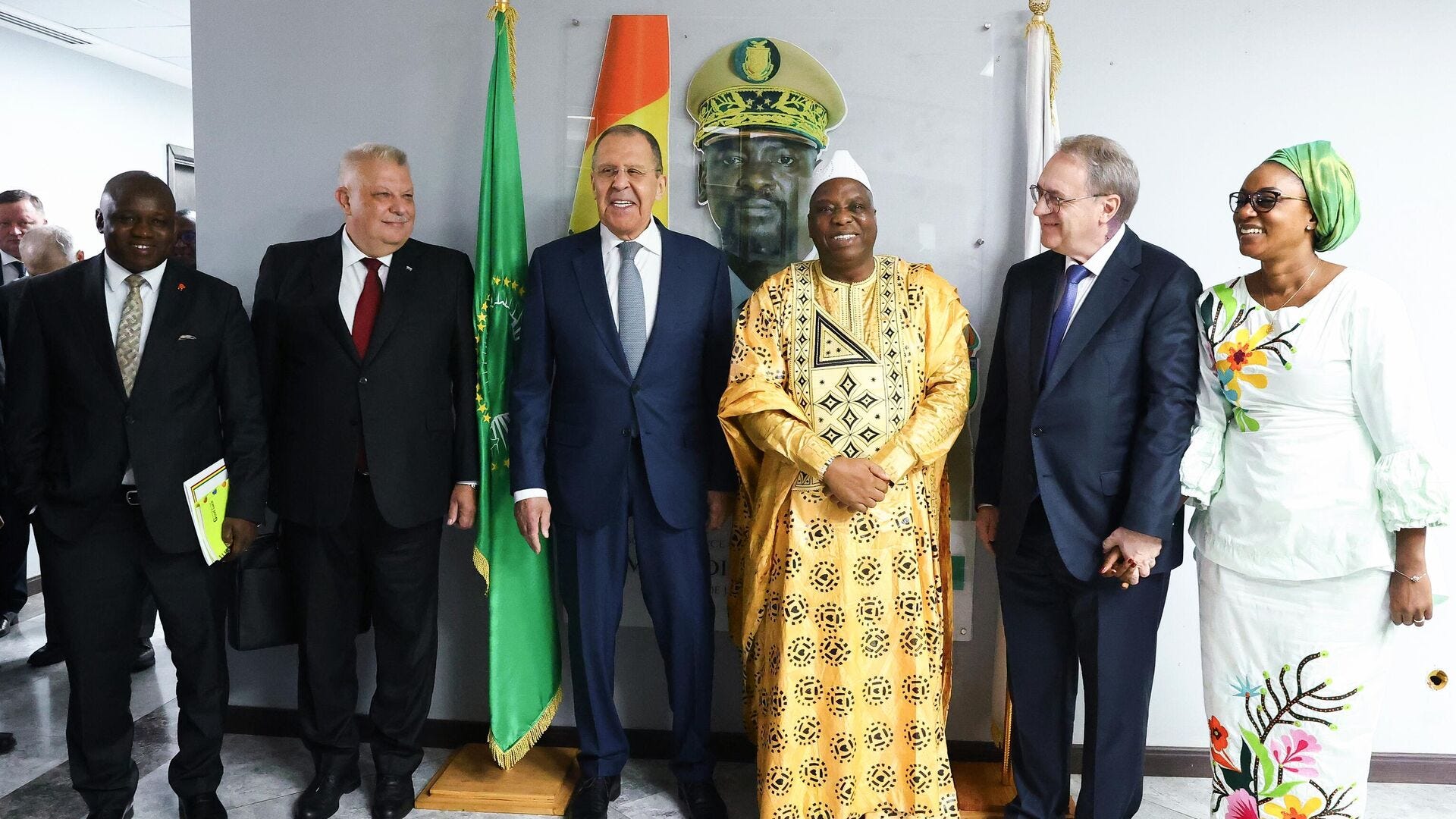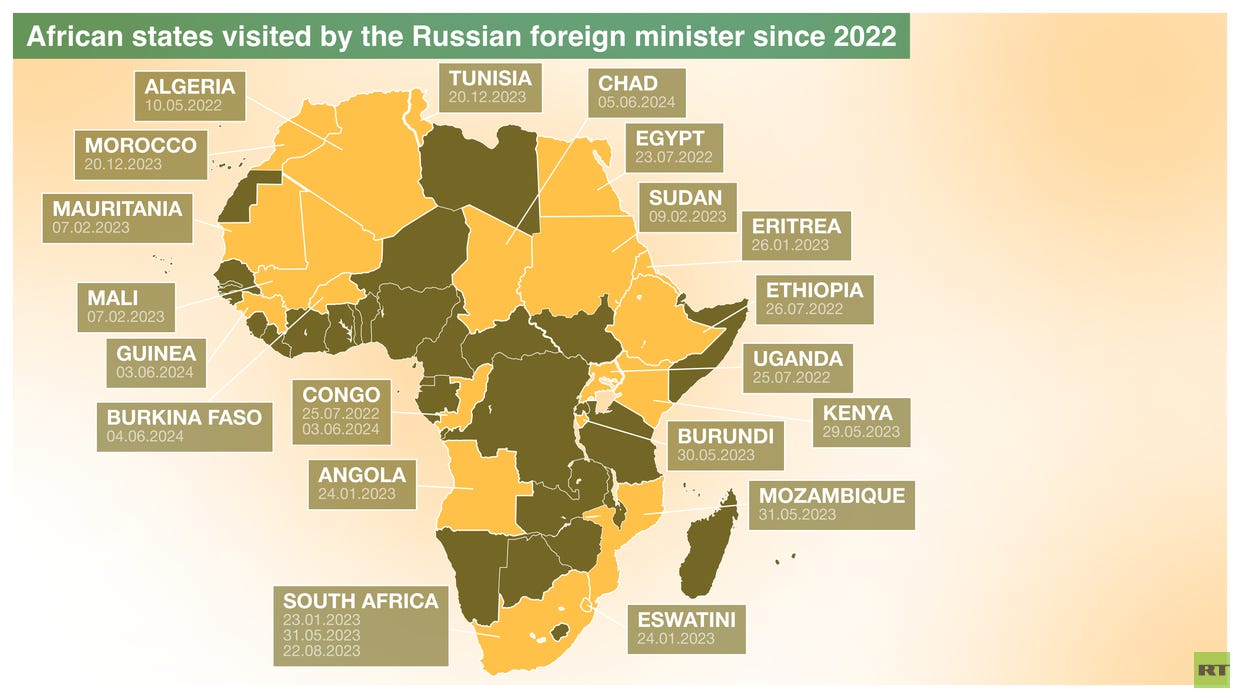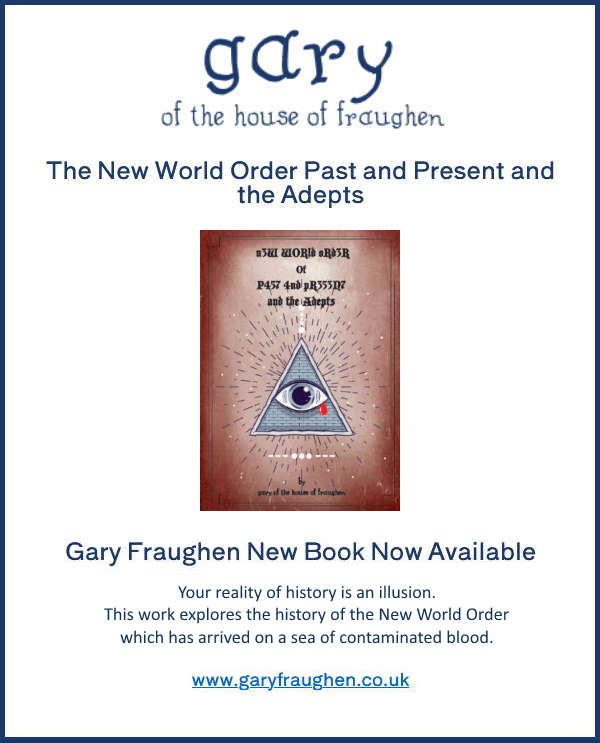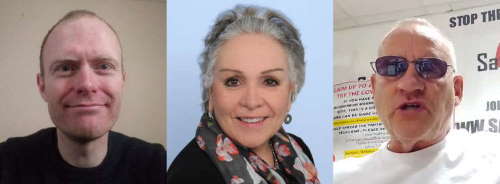While the spotlight was on the upcoming SPIEF and several distractions experienced by those invited to attend, Lavrov was busy on yet another tour of Africa that actually garnered some decent reporting. The press statements Lavrov made after his meetings were all rather similar. The first one in Guinea is a good example:
Question (retranslated from French): Mr Minister, could you share your goals and the objectives that you discussed during your visit to Guinea?
Sergey Lavrov: The Russian Federation and the Republic of Guinea have been friends for a long time. Immediately after Guinea was one of the first to gain independence and get rid of the colonial yoke, our country (at that time the USSR) signed an agreement with it on the establishment of diplomatic relations. This was in 1958.
Today, while we were on our way from the Foreign Ministry to meet with President of the Transitional Period Miguel Doumbuya, my friend Mohamed Kouyaté gave me a real tour. He showed what was built here by the Soviet Union: a university, a central stadium, a hospital and other infrastructure facilities.
Russia continues to actively contribute to the economic development of Guinea today. Such Russian companies as UC RUSAL, Nordgold, and a number of others have been operating here for many years. They create their own enterprises in this country. A new hospital was built and a research centre was set up to help Guineans fight Ebola and the COVID-19 pandemic.
Every year, through various channels, we allocate hundreds of scholarships for Guinean citizens to study at universities in the Russian Federation in civilian specialties. We train cadets, who then replenish the armed forces of Guinea, as well as medical personnel, which are so necessary at a time when infectious diseases require daily attention.
We are developing military-technical cooperation, taking into account the need to strengthen Guinea’s defence capability, including in connection with the continuing and growing terrorist threats.
The bilateral agenda is rich. We are closely cooperating in the international arena, primarily at the United Nations, as well as within the framework of relations between the African Union and the Russian Federation. In concrete terms, we discussed issues related to the UN’s work on various crises, primarily the situation in the Gaza Strip.
We talked about plans to develop relations between Russia and Africa after the second Russia-Africa summit held in St Petersburg in July 2023. We discussed preparations for the first-ever meeting of the foreign ministers of Russia and the African continent, which will be held in November in Sochi.
You asked about the purpose of the visit. The goal is to discuss the further positive development of our relations, in contrast to other “guest performers” coming to Africa, who demand to abandon positive cooperation with the Russian Federation and China.
The overwhelming majority of our African friends have had the opportunity to see that the demands and ultimatums are put forward by those who have nothing to offer from a positive and mutually beneficial agenda. And the Russian Federation has it. We reaffirmed our commitment to further and comprehensively deepen our relations during our meetings with Minister of Foreign Affairs, African Integration and Guineans Abroad Miguel Kouyaté and President of the Transitional Period Miguel Doumbuyoya. [My Emphasis]
RT for a change provided an excellent report that’s worthy of providing in-whole:
Lavrov’s African tour: What Western media won’t tell you: Yet again, many in the foreign media have failed to see the true significance of the Russian minister’s frequent visits to the continent:
This week marked the start of Russian Foreign Minister Sergey Lavrov’s traditional annual tour to African countries. This time, he has focused on countries in the Sahel (such as Guinea, Burkina Faso, and Chad) and the Republic of the Congo. Last year in May, he visited East Africa, and in December, he was in the north of the continent.
Over the past year, Lavrov’s engagements with African politicians have become more frequent, transitioning from something exceptional a few years ago to now being seen as routine. The minister now speaks with Africa almost every week. In January, he met with representatives from the Algerian Ministry of Foreign Affairs, in February with colleagues from Egypt, Mali, and South Africa, in March – Nigeria and Namibia, and in May, Sierra Leone, among other contacts. He has also had meetings with the King of Eswatini and phone calls with diplomats from various African countries. [The cycling in and out of Moscow by African and West Asian delegations is almost constant, which wasn’t the case 18 months ago.]
It’s worth noting that Sergey Lavrov often easily finds a common language with African colleagues, many of whom studied in the USSR/Russia. For instance, the current head of Sierra Leone’s Ministry of Foreign Affairs, Timothy Musa Kabba, is a graduate of the St. Petersburg Mining University, while the head of the Ministry of Foreign Affairs of the Republic of the Congo, Jean-Claude Gakosso, studied at St. Petersburg State University (when it was still known as Leningrad University).
The intensity of these interactions is set to continue: following his tour, Lavrov will take part in the St. Petersburg International Economic Forum (SPIEF), where the president of Zimbabwe is expected to attend, along with representative delegations from Sudan, Burkina Faso, and other countries. The BRICS summit is scheduled for October in Kazan, followed by the Russia-Africa ministerial conference in November. Despite this busy schedule and high frequency of contacts, it does not negatively affect their essence. [On the contrary; they help build them.]
Critics tended to view Lavrov’s African visits in 2022-2023 through the prism of the Russian-Ukrainian crisis – ostensibly in 2022, Lavrov went to Africa to explain Russian approaches, and in 2023 – the prospects of the Black Sea grain deal. At that time, there could be three or four high-level delegations from influential powers on the continent at once, seeking to win Africa over against the backdrop of events in Europe. By 2024, external factors have already become routine, African countries are unwaveringly following their course of neutrality, and the grain deal has ceased to exist – which, by the way, did not lead to catastrophic consequences for global food security. Despite this, the need for regular high-level contact remains.
Russia’s approach in Africa is becoming more comprehensive and proactive, and aims to inform other countries on the continent about its actions and intentions. By engaging on multiple fronts simultaneously, Moscow can pursue a balanced approach that considers the interests of the widest possible range of friendly forces, yielding positive results already.
During his visit to Guinea, Lavrov met with his counterpart, Morissanda Kouyate, and transitional president Mamadi Doumbouya to discuss the prospects for economic and military-technical cooperation, as well as in the field of medicine. Guinea stands out as one of the leaders on the continent by the volume of accumulated Russian investments due to RUSAL projects for bauxite mining and alumina production. Lavrov’s visit reaffirmed Conakry’s interest in maintaining friendly relations with Moscow.
The visit is also important in the context that, despite being a country from which a series of coups started in 2019 in the Sahel region, Guinea has adopted a less anti-Western stance, has not expressed intentions to withdraw from ECOWAS or join the Alliance of Sahel States, and was the only coup-belt country not represented at the Russia-Africa Summit in 2023 at the head of state level. Discussions between Lavrov and Guinea’s leaders likely centered on the situation in the Sahel and West Africa as a whole.
Lavrov’s visit to the Republic of Congo marks his second trip there since 2022. Despite the limited economic ties between the countries so far, these frequent visits are not unexpected. Denis Sassou-Nguesso, the president of the Republic of the Congo, is a significant and influential figure in African politics and plays a crucial role in shaping relationships among Central African nations. He chairs the African Union (AU) High-Level Committee on Libya, a special group established by the AU for mediation efforts in Libya. During Lavrov’s meeting, there was a clear alignment between the positions of Moscow and Brazzaville on the situation in Libya. Additionally, President Nguesso has been instrumental in advancing the African peace initiative on Ukraine.
On the night of June 5, Lavrov arrived in Burkina Faso to inaugurate the Russian embassy. The moment is historic, marking the reestablishment of a previously closed diplomatic point (the Russian embassy in Ouagadougou had been shut since 1994). Plans are also in place to open a Russian embassy in Equatorial Guinea later this year, with discussions ongoing about establishing a diplomatic mission in Sierra Leone. Wrapping up his tour, Lavrov visited Chad, where Russia’s relations have been activated in recent months.
The Western media’s response to Lavrov’s visits has followed their usual narrative, linking his presence with terms like “coup,” “war,” and “Ukraine.” Allegations were made that Lavrov aimed to influence Sahel nations to remain neutral on the Ukraine issue. It goes against logic, however. It seems unlikely that the Russian foreign minister would need to advocate for neutrality, for instance, in Burkina Faso, where Russian military personnel have been stationed since January. It would be logical to go “fighting” for Africa in countries like Cote d’Ivoire, Nigeria, Angola, or Cape Verde, where US Secretary of State Antony Blinken visited in January. Interestingly, despite both diplomats focusing primarily on West Africa, the lists of the countries they visited did not overlap, though almost six months divided them. Diplomatic intricacies indeed.
Russian-African relations are gradually becoming routine. No longer does a flashy headline or a major deal need to explain a visit by the Russian foreign minister to an African nation. And this is a good trend. [My Emphasis]
Yes, the normalization of relations between Africa and Eurasia is a boon for both. The words delivered by Zimbabwe’s president at the SPIEF were echoed by every African Lavrov talked with. On the issue of security and military relations, the code word here is terrorism as both Africans and Russians know who sponsors the terrorists and why. So, anti-terrorism can be seen more properly as anti-Colonial, just as the Zionist’s actions resonate with many Africans having suffered similar tragedies over the span of the Age of Plunder. IMO, the presser in Chadmerits being reported in full:
Question (retranslated from French): Chad and the Russian Federation have maintained diplomatic relations since 1964, and many agreements were signed between 1964 and 1974 in the fields of economy, culture, technology and aviation. How can you sum up the implementation of these agreements 60 years later?
Sergey Lavrov: Today we did not talk about summing up, but about building plans for the future based on the accumulated experience in accordance with the strategic areas that were defined by President of Russia Vladimir Putin and President of Chad Moucass Idriss Déby during their meeting in the Kremlin in January of this year.
In addition to the agreements you mentioned, agreements were subsequently signed, including on cooperation in the military and military-technical spheres. We have a memorandum on foreign policy consultations between the foreign ministries of Russia and Chad. It has been in place since 2013, but we can think about modernising and updating it to meet the challenges of modern world politics, where a huge number of problems have accumulated. President of the Republic of Chad Manuel Idriss Déby spoke about this in detail today.
We are developing cooperation in the field of security. Chad is interested in this, given that there are still terrorist threats in this region, which are associated with the destruction of Libyan statehood in 2011.
We agreed to focus at this stage on efforts that will make it possible to bring our trade and economic ties and investment cooperation up to the high level that our political dialogue and ties in defence and security, humanitarian and educational spheres have reached. There are a number of very interesting proposals in this regard. President Idriss Déby also spoke about them today.
We agreed that our Chadian friends would convey to us their wishes on the forms of cooperation and the sectors of their economy where they consider the presence of Russian economic operators useful.
A delegation from the Chadian Chamber of Commerce and Industryparticipates in the St. Petersburg International Economic Forum. It opened a permanent representative office in Russia. This is also an important stable channel for exchanging views on which projects will meet the interests of the development of the Chadian economy, solve social problems and will be based on the principle of mutual benefit.
We have a common assessment that the tasks set at the presidential level in January of this year are a priority. Today we discussed the next steps to implement them. This work will be continued by financial, economic departments, structures dealing with investment and other related problems.
It seems to me that a useful conversation took place. We will work even more actively.
Question (retranslated from French): You have already been on a visit to Africa for several days. Today you are here. Can we talk about a retrospective of Russia’s relations with Chad today? We noted that today you discussed a number of issues, in particular, the issue of education. We are interested, for example, in the issue of infrastructure. What can you say about this? How will Russia assist Chad and other African countries?
Sergey Lavrov: As for infrastructure, as I have already said, we have asked our Chadian friends to prepare a list of proposals on the economic and infrastructure sectors in which they would be interested in seeing the participation of Russian economic operators.
Our companies have good experience in infrastructure matters. In particular, Russian Railways operates in many African countries, preparing projects for the creation of railways and related infrastructure. If this area is included in the list that our Chadian friends will give us, we will have a positive reaction. I would like to emphasise that we have extensive experience in this area.
Question (retranslated from French): The crisis in Ukraine was caused by the West’s policy of interfering in the internal affairs of sovereign states. What is Chad’s attitude to Western approaches to regime change, to disrespect for the independence of countries, traditions and values of peoples?
Sergey Lavrov (speaking after Ahmed Koulamallah): First of all, we fully respect the position of Chad and other countries that emphasise their neutrality. We, like Chad, would also prefer negotiations. Moreover, such talks took place in April 2022 at the initiative of the Ukrainian side, which proposed the basic principles of a peace treaty on the settlement. We agreed with these principles. They were initialed on both sides.
Then the Western “masters” of the Kyiv regime forbade them to sign this document. They said that it was necessary to fight in order to inflict a “strategic defeat” on Russia. To do this, they said that they would “pump” them with the most modern weapons. Which is what they are doing now. They supply long-range systems and publicly say: attack any target on the territory of the Russian Federation. At the same time, a “peace conference” is being convened in Switzerland, which will be held in ten days.
It’s hard to understand how it fits together. Either you are for the “strategic defeat” of Russia, or you are for peace conferences. But if you are for peace, then it is probably necessary (as the minister said) to solve the problem with the participation of all parties involved. And not demand a meeting in Switzerland to confirm or support without any reservations the notorious “formula” of Vladimir Zelensky, which is an ultimatum demanding a “strategic defeat” from Russia. And so that we somehow accept it voluntarily.
The organizers of this conference do not want peace. The principle by which they “invite” various countries of the world majority, including African ones, is as follows. That’s what they say: you must decide who you are for – with us or with Russia. Those who will be with Russia will be punished. That’s the point of this conference.
Most. I hope I won’t give away a big secret. Many African leaders, as President of Chad Idriss Déby also noted today, have long stressed the need for mutually respectful relations between all countries of the world. Several times it was said that the days when a Western ambassador could come to the president of an African country and give him instructions are gone. Thank God, such times will not return to Africa.
In Ukraine, everything is happening as it was in post-colonial times. Ambassadors come and give instructions to the leaders of the Kyiv regime. So draw your own conclusions. We state our position honestly.
Question (retranslated from French): You stressed that Chad is setting an example for other states in the Sahel, but at the same time it faces security challenges. Is the Russian Federation ready to help Chad overcome these difficult challenges? If so, how?
Sergey Lavrov: I have already spoken about this in detail twice today. I mentioned the agreements on military and military-technical cooperation that were signed between the Russian Federation and the Republic of Chad a long time ago. These agreements did not remain on paper, they are being implemented. The Chadian Armed Forces and Security Forces receive military products from the Russian Federation that strengthen your country’s defence capability and enable it to combat terrorism more effectively. This cooperation will continue.
Question: Russia and Chad discussed the joint implementation of major joint projects on geological exploration, subsoil use in Chad and nuclear energy. Did you manage to come to any specific agreements? Maybe some companies are already going to “enter” here?
Sergey Lavrov: We have managed to come to specific agreements. In the very near future, our Chadian friends will prepare for us a list of projects in which they would welcome the participation of Russian companies. We have already listed all these areas that you are talking about: energy, agriculture. President of Chad Mourab Idriss Déby showed particular interest in the peaceful use of nuclear energy. He mentioned the experience that our Rosatom State Corporation has accumulated in cooperation with African (and not only) countries, being one of the leaders in technologies for the peaceful use of nuclear energy.
We will wait for specific wishes from our Chadian friends. We are ready to send an economic mission here in order to discuss promising projects on the spot. This is the agreement that we have reached today.
Question (retranslated from French): Will relations between Chad and the Russian Federation affect relations between France and Chad?
Chad supports other countries, in particular neighbouring countries such as the Sudan. Can Chad strengthen relations with other states? What is your position? There are many migrants here now. Is this related to what is happening in the Sudan?
Sergey Lavrov (speaking after A. Koulamallah): The efforts that Chad is making and that other countries can make to return peace to Sudan… There is no doubt that this war is disastrous. It is already associated with new flows of refugees and terrorist threats. As in other cases, it is imperative that all parties sit down at the negotiating table and begin to agree on how the people of their country should live.
Let me remind you that the problems with Sudan have a long history. At one point, the United States insisted on dividing Sudan into Sudan and South Sudan. And this was done. President Al-Bashir cooperated within the framework of this agreement. It would seem that one of the goals of Washington’s foreign policy has been achieved. Soon the United States began to be “offended” and was dissatisfied with the way it behaved in both Sudan and South Sudan. Both were brought under American sanctions. The “experiment” did not work out. We don’t care about the fate of the people, we will now “push through” our interests. Now everyone needs to stop and sit down to negotiate. As in Libya, as in any other crisis point.
We support what Chad is doing. We understand that this Republic is one of the most dependent states on the consequences of this confrontation.
As for your first question. I can guarantee that our friendship with Chad will not affect our relations with France in any way. France has a different approach. It comes from the fact that either you are with us, or you are against us.
I remembered a story that happened five years ago. At the UN General Assembly, I met with the then Minister of France, Jean-Yves Le Drian and the EU’s chief diplomat Josep Borrell. They asked me (the two of them came and began to ask questions): why are we sending our military instructors to Mali? I was a little taken aback. I asked: what is the problem? The legitimate Malian leadership has asked us to do so. I explained to them that this request is connected, among other things, with the fact that the French are withdrawing their units from Mali, which were allegedly there to fight terrorism. But in response, I was told once again that this is, after all, “the territory of French influence.” That’s all.
We do not have such a principle. We are friends with those who want to be friends. We are never friends against anyone. [My Emphasis]
Lavrov’s example of how the Ukraine conflict has many similarities to colonial and neocolonialism was quite apt and is perhaps the #1 reason why African nations won’t stand against Russia, while many provide active support. The longstanding good relations and trust in Russia’s credibility are the basic reasons why several important deals were made at the SPIEF between Burkino Faso and the Republic of Guinea with Rosatom, whose short notes are linked above. Africa’s development needs are great as is its potential. IMO, the West killed all its chances for good relations with Africa when it illegally invaded and murdered Ghaddafi along with the other chaos it fomented before and after. Yes, the Neocolonial parasite still inhabits parts of Africa, but the disease is realized, the cure understood and is being implemented.
One last item involving Lavrov are his answers to Pavel Zarubin’s “Moscow. Kremlin. Putin” program questions:
Question: US President Joe Biden said in an interview that the United States does not allow Ukrainians to strike at Moscow and the Kremlin. Isn’t this a step towards a big escalation?
Sergey Lavrov: It is difficult for me to comment on this. But if he said this in a clear mind and memory, and boasts that he did not order the bombing of Moscow, then this implies that everything else is possible.
But by and large, they bomb everything else. I remember that not so long ago, at the beginning of the conflict, attack drones were launched at Moscow. At that time, no one slapped the hands of Vladimir Zelensky’s regime. So our Western colleagues should not try to embellish their own behaviour.
At a meeting with representatives of international news agencies, which included many Western ones, President Putin clearly said that without the direct participation of the United States, Britain and the Europeans, the strikes would not have been carried out on the territory of the Belgorod and Kursk regions and other Russian territories. They all know this very well.
Also look at how our French colleagues “vibrated”. Prime Minister Geir Attal suddenly began to say that they do not have instructors in Ukraine. It’s not true. They know it. Therefore, the calculation is apparently that in this way “quietly” step by step to accustom everyone to the idea that there seems to be nothing, but one more step will be taken tomorrow, another one the day after tomorrow.
We all see this and we have a full understanding of what they are doing and what role they are playing in the war unleashed against Russia. We know how to deal with it.
Question: In your opinion, did they hear Vladimir Putin’s signal about the possible supply of our weapons to other regions of the world? Understand?
Sergey Lavrov: I have no doubt that they have heard and will understand. There are still people who know how to analyze. They are simply engaged in escalation in order to please their radical electorate and so on every day before the next election campaign. I think they will understand. Or rather, I think that they have understood and will draw conclusions. This is an absolutely, as they say, symmetrical response. If you arm our enemy, we will decide for ourselves how to respond to your hostile actions.
It appears the old “The enemy of my enemy is my friend” doctrine’s back in play or perhaps it’s merely a threat. Hmmm… Ansarallah says it has a hypersonic missile. Its latest attacks on the USS Eisenhower forced it to move some 500 kilometers to take it out-of-range. No press reports on damage to Zionist or Imperial assets. IMO, many will miss Lavrov’s response: “We know how to deal with it,” and all the hand wringing about escalation to nukes will continue. Indeed, Lavrov perhaps unintentionally gave away that Russia has already decided what it will do in response. Or perhaps Russia’s ongoing actions will negate the need for some sort of response. It’s clear from the French EUP elections that political chaos is ready to engulf EU/NATO, and that isn’t Russia’s doing; it’s the Outlaw US Empire in reality.
Western policy in Africa, Latin America and Eurasia is in shambles, while Western cohesiveness is being gravely tested by the Zionists and their Genocide Project. Russia just got global affirmation with its SPIEF, while China has shown it will speak loudly from a position of strength if it must. I understand why some despair for the future. But despite the insipid stupidity we see from Western officials, we must remember they are merely the mouthpieces for those that stand behind them and make the most important decisions.
*
*
*
Like what you’ve been reading at Karlof1’s Substack? Then please consider subscribing and choosing to make a monthly/yearly pledge to enable my efforts in this challenging realm. Thank You!















